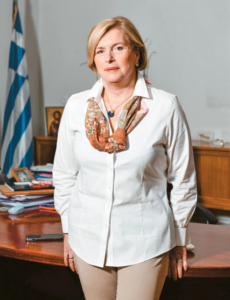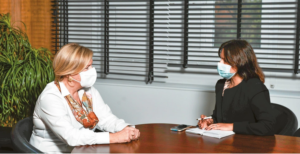The strategy of the Ministry of Health for the management of the coronavirus pandemic this winter, but also the next steps for the strengthening of the health system is analyzed in “Proto Thema” by the Deputy Minister of Health Mina Gaga.
The availability of monoclonal antibodies within the next 10 days for patients with COVID-19 infection is crucial but does not eliminate the need for vaccination, the minister stressed, urging citizens to invest in dialogue with specialists and not in polarization. As a doctor who has served in the NHS for many years, Ms. Gaga is announcing changes in medical specialties, in the field service, as well as a package of incentives to fill vacancies in remote and border areas.
– The pandemic, as everything shows, will test the resilience of the NHS this winter as well. How is this winter different from last year and how does this affect the epidemic management strategy (in the community and in the health structures)?
The resilience of the NHS has been tested for almost two years, since the beginning of the COVID-19 pandemic. We reaching a point where the daily cases are increased to levels much higher than last year, while an increasing trend is observed in hospital admissions, but in smaller proportions proportional to the cases, thanks to the vaccination. Vaccination coverage for citizens over 12 years of age is 66.7%, but it is not uniform. We would like a higher rate of vaccination coverage, especially in some areas such as northern Greece.
Where the percentage of vaccinated citizens is satisfactory, this can contribute to an “easier” winter. In any case, throughout Greece we continue to be vigilant and observe the necessary measures, while further strengthening the system, establishing better financial incentives for both health professionals who already staff the system and for those who operate outside the NHS to assist, where needed.
– The “Eleftheria” campaign has been stationary for a long time. How do you explain it? How can this campaign continue in order to achieve its goal of vaccinating a very high percentage of the population?
The vaccination campaign has progressed well to date, as we already have over 12.5 million vaccinations and over 6.3 million full vaccinations. Of course, we can do better and we will achieve this if we proceed calmly, without polarization and if we all decide that the vaccine and the observance of the measures is the only way out of this health and social crisis. Our goal is to persuade, not to force.
We want dialogue, not pressure solutions. The four-digit number of EODY as well as the questioning platform (chat) on the website of the Organization will contribute in this direction.
– In the field of pharmaceuticals for the management of COVID-19 it has already become known that Greece will procure monoclonal antibodies through the European Union. What stage are we in?
Within the next 10-15 days we will have received 2,000 monoclonal antibodies, which, as you know, according to the therapeutic algorithm will be administered with specific medical criteria by hospitals throughout the country. The aim of this treatment is to prevent the worsening of the disease with all that this implies for the need for mechanical ventilation and hospitalization in the ICU. However, the availability of good and effective drugs, as well as the antiviral pills that we also expect at the beginning of the year, do not eliminate the need for vaccination.
– There are innovative medicines for diseases for those who unfortunately we can not be vaccinated, such as many forms of cancer. However, patients complain about their delayed access to these treatments. Is the Greece slower than other countries on this?
We try to be fast in introducing new treatments, through institutionalized procedures followed by EOF and other stakeholders. In some cases we are even faster than many other European countries, such as a lung cancer drug that patients in our country received much earlier than those in Britain. In any case, the treatment protocols ensure that every patient who really needs it receives the medication he needs, while preventing the unnecessary waste of resources, which we all pay for.
Foreign Policy: Erdogan’s belligerence has US, Greece expanding ties – Analysis
– From “Sotiria” to the Ministry of Health, what are the urgent problems that you have identified as a health professional at the NHS and are you ready to face them from the position of Deputy Minister?
We have started and continue the visits to the hospitals but also to the Health Centers all over the country, seeking the open dialogue with the NHS executives not only on the issues related to the COVID-19 incidents but also on the overall operation of the system and the care of all patients. We work to optimize services so that they meet the basic needs of patients in their place of residence and provide easy access to more specialized care when needed.

– The announcement of permanent positions to fill the gaps in the NHS has been launched many times. However, there does not seem to be any interest from doctors and nurses. What incentives can be considered attractive to fill the positions?
We are considering a comprehensive plan to provide financial and scientific incentives to fill vacancies in health structures in remote and border areas. At the same time, we are looking at ways of upgrading the allowance for doctors who serve in “barren areas”. In addition, we have developed a number of “intangible” incentives for health professionals serving in the region, such as digital scientific liaison with central hospitals and continuing medical education.
– The reinforcement of Primary Health Care (PHC) was left behind due to the pandemic. At this stage, what can be implemented that has a direct and tangible result?
The primary role of PHC is to provide quality services accessible to all. In this direction, we are developing structures that will serve the citizens with scientific perfection, speed, without hassle, while limiting the burden on other hospitals. In this context and according to European standards, we are launching the strengthening of PHC with more general practitioners, a specialty that unfortunately in our country until recently did not attract interest.
This is just one aspect of the broader effort to reorganize the map of medical specialties. As is the case all over Europe, the positions of the medical specialties should correspond to the needs of the country’s health system in order to gradually eliminate the phenomenon of overcrowding in some specialties and shortages in others.
Also, in collaboration with KESY we change the way of training young doctors as well as the process of the field service: we promote 6-month training of medical graduates in clinics of the Pathological Department, in basic medical operations and in the management of traumatic and other emergencies. This exercise will serve as a preparation for the field service, so that the young doctors can start their term better equipped.
– The Ministry of Health has already announced the cooperation with the private sector in three areas (Thessaloniki, Volos, Larissa) for the needs of the pandemic. Are you considering similar collaborations in other areas?
The cooperation with the private sector continues in the best possible way and will continue during this winter, if necessary. No patient with COVID or not will be left unprotected.
– Can public-private sector cooperation in the face of the pandemic be the basis for a permanent and stable partnership, with a view to public health?
The private health sector has a strong presence in Greece over time, stronger than in other European countries. The pandemic proved that we can all together serve the common goal.
We are, therefore, open to any synergy, as long as it creates conditions for better care, without additional financial burden for the citizens. Requests from regional hospitals for medical equipment that can be met more quickly through a partnership with an private entity and to serve the citizens within the NHS are already being evaluated.
Ask me anything
Explore related questions





